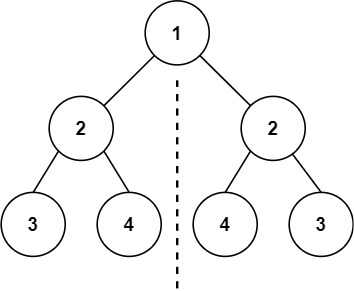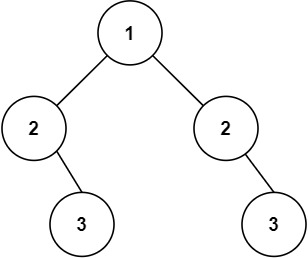4 KiB
Leetcode Symmetric-Tree
2022-07-05 10:15
Algorithms:
#algorithm #DFS #recursion #BFS
Data structures:
#DS #binary_tree
Difficulty:
#coding_problems #difficulty_easy
Additional tags:
#leetcode
Revisions:
N/A
Related topics:
Links:
Problem
Given the root of a binary tree, check whether it is a mirror of itself (i.e., symmetric around its center).
Examples
Example 1:
Input: root = [1,2,2,3,4,4,3] Output: true
Example 2:
Input: root = [1,2,2,null,3,null,3] Output: false
Constraints
Constraints:
- The number of nodes in the tree is in the range
[1, 1000]. -100 <= Node.val <= 100
Thoughts
[!summary] This is a #DFS #recursion problem
Method 1, DFS-like Recursion:
-
Base Cases:
- left and right are nullptr: true
- else if left or right is nullptr: false, must be asymmetric
- left->val != right->val: false
-
return check(left->left, right->right) && check(left->right, right->left)
Method 2, BFS-like Iteration: In the while loop:
-
Take two nodes from queue, they should be matched.
-
if both are nullptr, continue.
-
if one is nullptr, return false.
-
if val doesn't match, return false.
-
add left->left and right->right to queue (they will be matched as a pair)
-
add left->right and right->left to queue (they will be matched as a pair)
Solution
Recursion, 16ms
/**
* Definition for a binary tree node.
* struct TreeNode {
* int val;
* TreeNode *left;
* TreeNode *right;
* TreeNode() : val(0), left(nullptr), right(nullptr) {}
* TreeNode(int x) : val(x), left(nullptr), right(nullptr) {}
* TreeNode(int x, TreeNode *left, TreeNode *right) : val(x), left(left),
* right(right) {}
* };
*/
class Solution {
bool checkSymmetric(TreeNode *left, TreeNode *right) {
// If only one child is leaf it is not symmetric
if (!left && !right) {
return true;
} else if (!left || !right) {
return false;
}
if (left->val != right->val) {
return false;
}
// One node has two childs, traverse them in pairs.
return checkSymmetric(left->right, right->left) &&
checkSymmetric(left->left, right->right);
}
public:
bool isSymmetric(TreeNode *root) {
// DFS-like recursion
return checkSymmetric(root->left, root->right);
}
};
BFS, iteration, 8ms
/**
* Definition for a binary tree node.
* struct TreeNode {
* int val;
* TreeNode *left;
* TreeNode *right;
* TreeNode() : val(0), left(nullptr), right(nullptr) {}
* TreeNode(int x) : val(x), left(nullptr), right(nullptr) {}
* TreeNode(int x, TreeNode *left, TreeNode *right) : val(x), left(left),
* right(right) {}
* };
*/
class Solution {
bool checkLeaves(TreeNode *l, TreeNode *r) {
// Check if the leaves are symmetric.
if (!l && !r) {
return true;
} else if (!l || !r) {
return false;
}
return true;
}
public:
bool isSymmetric(TreeNode *root) {
// BFS-like iteration, using queue.
// Ensure root has two childs
if (!checkLeaves(root->left, root->right)) {
return false;
}
queue<TreeNode *> pending;
pending.push(root->left);
pending.push(root->right);
TreeNode *l, *r;
while (!pending.empty()) {
l = pending.front();
pending.pop();
r = pending.front();
pending.pop();
if (l && r) {
// Check val of l and r
if (l->val != r->val) {
return false;
}
// Chech if the child nodes are symmetric
if (!(checkLeaves(l->left, r->right) &&
checkLeaves(l->right, r->left))) {
return false;
}
// Add more to queue
pending.push(l->left);
pending.push(r->right);
pending.push(l->right);
pending.push(r->left);
}
}
return true;
}
};

